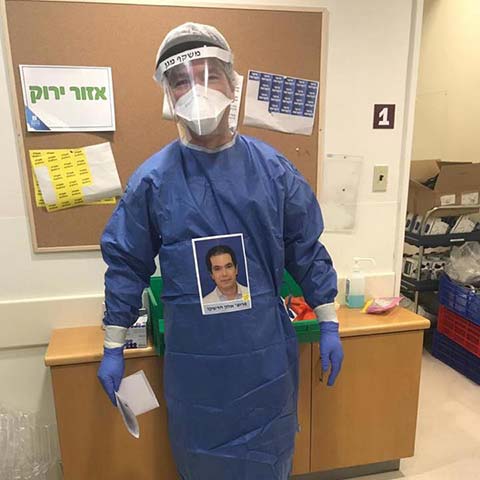
“Perhaps more than ever in these complicated times, connecting with patients is very important,” says Prof. Alon Hershko, director of Hadassah Hospital Ein Kerem’s Internal Medicine Department.
Prof. Hershko is involved daily in treating COVID-19 patients. To ensure that there is a personal connection between the hospital staff and the patients despite the precautions necessary in treating those with the virus, Prof. Hershko has asked his healthcare teams to pin smiling photos of themselves to their protective clothing. In this way, patients not only feel more of a human connection, but also can identify the faces behind the masks.
“This definitely helps to make the experience more personal when a doctor or nurse enters the patients’ rooms to check on them, administer a treatment, or provide an update on their condition,” Prof. Hershko says. “These patients are here alone, far from everything they love and need. Their connection is with us, and we must all wear our best smile.”
Prof. Hershko was surprised recently to receive a letter from Rabbi Aaron Teitelbaum, the New York-based head of the Satmar Hassidim, thanking him for the personal attention patients have received at Hadassah. Among the patients Prof. Hershko and his staff have saved is the leading Israeli rabbi, nonagenarian Yitzchok Tuvia Weiss, who had contracted the coronavirus.
Attributing Hadassah's success in treating COVID-19 patients to the many consultations among staff members, Prof. Hershko emphasizes, “We’re constantly exchanging ideas. The administration, the doctors, and the nurses are working as one.”
Born at Hadassah Hospital in 1965, Prof. Hershko has deep Hadassah roots. His father, Chaim Hershko, was a professor of hematology at Hadassah. His sister, Prof. Dorith Shaham, heads Hadassah’s Thoracic Imaging Center. His wife, dermatologist Klilah Hershko, studied at Hadassah, and their daughter Anat is an intern in the hospital.
Prof. Hershko, president of the Israel Association of Allergy and Clinical Immunology, has been urging patients with asthma and other serious diseases, as well as allergy sufferers, not to avoid treatment because of the COVID-19 pandemic. “They need to receive regular treatment without changes to their routine,” he says.









